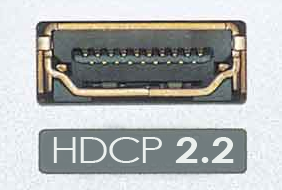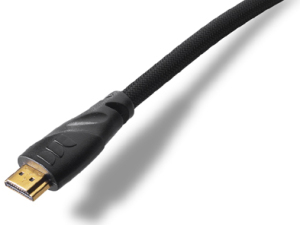
We just discussed how prolific Ultra HD 4K TVs were at this year’s CES. Ultra HD or UHD 4K TVs are the next generation of TVs that everyone will be using sooner or later. The problem is that during this transition period not all of today’s 4K TVs will work with future cable set-top-boxes, disc players, etc. The issue comes down to two major pieces of home tech TV jargon: HDMI and HDCP.
We’ll start with HDMI. People may know HDMI as the cable to plug things like an Apple TV or cable box into TVs. The full story though is that HDMI is a standard that defines how a device like a cable box will talk with a TV. Its really a two-way conversation. In the old days it was a one way conversation: a TV cable just sent information using electrical signals to a TV. HDMI still uses electrical signals (in the form of digital data), but information goes both ways, e.g. TV resolution and control info. Since there are so many details that need to be agreed on, industry folks have created standards like ‘HDMI 1.4′ or ‘HDMI 2.0’. If manufacturer’s gear honours the standard’s rules, it can talk to each other using HDMI. At this point you may be asking what does all this have to 4K TVs? Well, since there is so much data needed for those crystal clear 4K TVs, you’ll need at least HDMI 2.0 for things to work. HDMI 2.0 is the current top HDMI version, and any TV, cable box, AV receiver, etc. has to be at least HDMI 2.0 compatible if you want it to work with 4K TV content.
HDMI. At this point you may be asking what does all this have to 4K TVs? Well, since there is so much data needed for those crystal clear 4K TVs, you’ll need at least HDMI 2.0 for things to work. HDMI 2.0 is the current top HDMI version, and any TV, cable box, AV receiver, etc. has to be at least HDMI 2.0 compatible if you want it to work with 4K TV content.
Ready to move on to HDCP? HDCP is High-bandwidth Digital Content Protection and is a type of digital copy protection. This is a tool to protect TV shows and movies from digital pirates and other content copiers. Movie studios and manufactures have agreed that devices like cable boxes, AV receivers, TVs, etc. must be HDCP compliant, or content will not play properly. As with any arms race, the weapons must be updated. For 4K TV, the agreed level of protection is currently HDCP 2.2. This means that any 4K TV must be HDCP 2.2 to work properly with 4K content.
What all this boils down to is that for 4K UltraHD, any TV or TV device you buy has to be at least HDMI 2.0 and HDCP 2.2 compatible. If not, its quite possible that they won’t work together. Shockingly, not all 4K TVs, 4K AV receivers, and such are both HDMI 2.0 and HDCP 2.2 compatible. This could mean anything from a lower than expected picture quality or a sad, empty black screen. Either way its extremely annoying when you think that you’re buying the latest and greatest technology. Hopefully this helps you understand the issues (and jargon), as the better equipped we all are, the better the home tech experience is for everyone.
